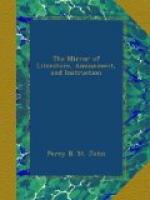(To be continued.)
* * * * *
LEDYARD TO HIS MISTRESS.
(For the Mirror.)
Dost wish to roam in foreign climes
Forget thy home and long past times?
Dost wish to be a wand’rer’s
bride,
And all thy thoughts in him confide?
Thou canst not traverse mountain seas,
Nor bear cold Lapland’s freezing
breeze;
Thou canst not bear the torrid heats,
Nor brave the toils a wand’rer meets;
Thou wouldst faint, dearest, with fatigue
Trav’ling the desert’s sandy
league.
Pale hunger with her sickly pains
Will silence thy heroic strains;
Thy heart—now warmly beats—will
chill
And stop thy lover’s wonted skill.
He could not see thee pine and weep
Nor could he ease thy troubled sleep—
’Twould quite unman his firm resolve,
And with grief thy love involve.
TERRENUS.
* * * * *
ROMAN ALTAR.
(To the Editor of the Mirror.)
Enclosed I send you a drawing of a Roman votive altar, which was found in digging a cellar about six feet deep, in St. Sepulchre’s Gate, Doncaster, in the year 1781. It is the oldest relic of antiquity which Doncaster has yet produced, and is of exquisite engraving and workmanship. Upon the capital, or top of the stone, a small space above the sculpture of the altar itself, is a crater or flowing bowl,[4] sacred to Bacchus, the god of wine; on the dexter, or right side of the altar, is a flower-pot, or cornucopiae, with five branches in it, loaded with leaves and fruit, sacred to Ceres, or Terra-Mater, the goddess of plants; and on the sinister, or left side thereof, is a large jug or pitcher with a large handle, also sacred to Bacchus. It is about 2 feet 6-1/2 inches in height, and 1 foot in breadth at the base. The corporation employed a Mr. Richard John Tetlow, of Ferrybridge, a celebrated antiquary, to interpret the inscription, and give them his opinion on its age. They also sent it to the Antiquarian Society in London for inspection.
[4] If not a flowing bowl, then it is the shield of Diana.
Interpretation of the Society.
Matribus magnis,[5] Nantonius[6] Orberthol, vota solvit lubens merito.
[5] Juno and Diana.
[6] For Antoninus, in the
year of Christ 161. Antoninus Philosophus
was
the Roman emperor, and succeeded Antoninus Pius, according
to
Dr.
Littleton.
Translation.
To the great mothers, (goddesses,) Anthony Orberthol willingly and meritoriously has performed his vows or promises.
Interpretation of Mr. Tetlow.
Lunae, Latonae, Lucinae, Matribus magnis Antonius
Orbis Romani Imperator Bonis
Oeis Altare. vota. solvit. lubens merito.




